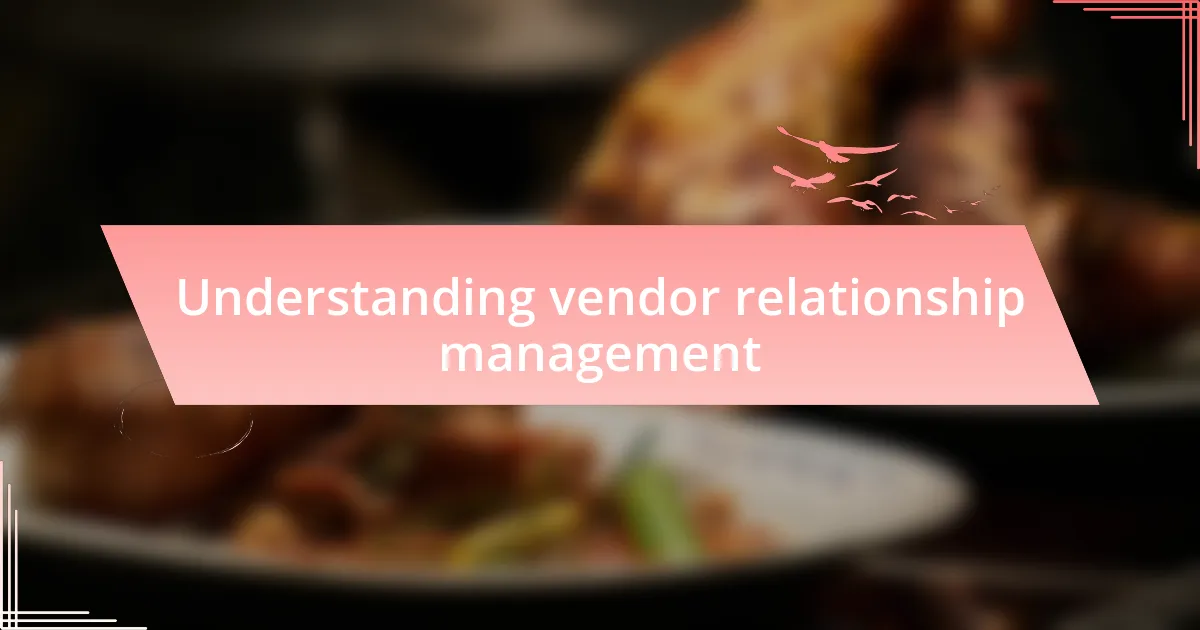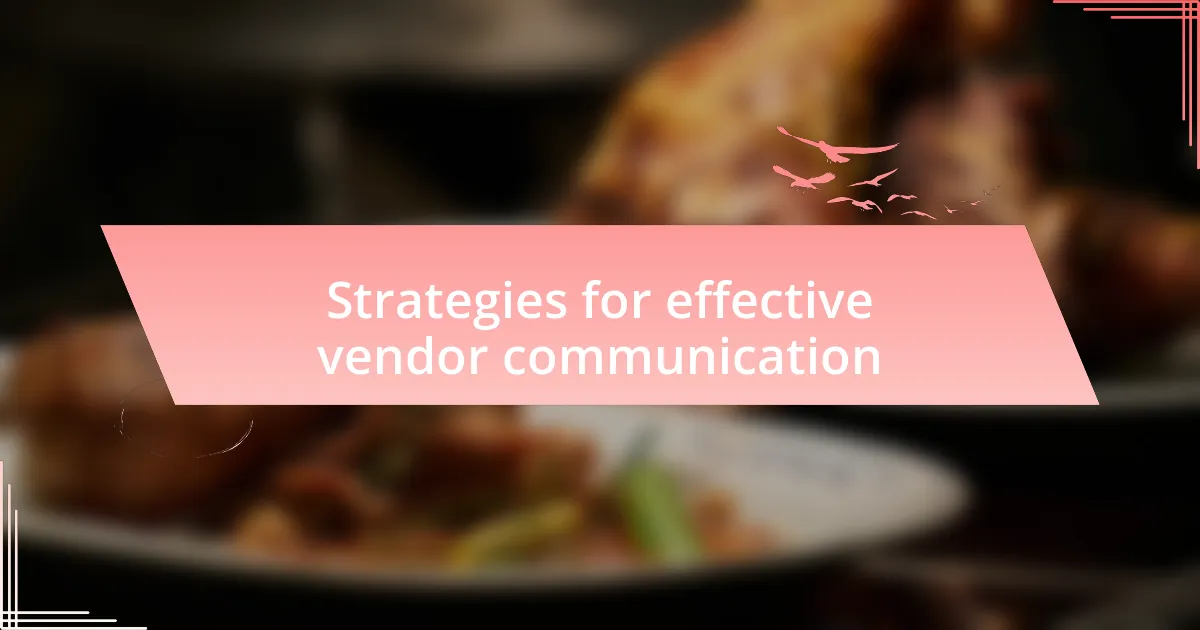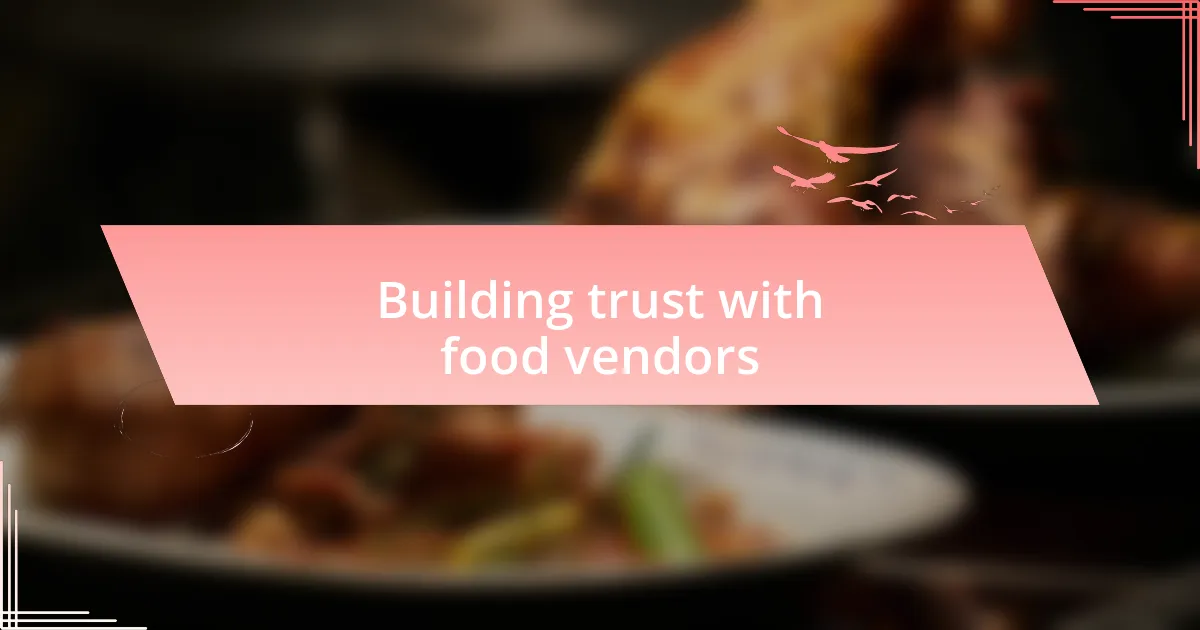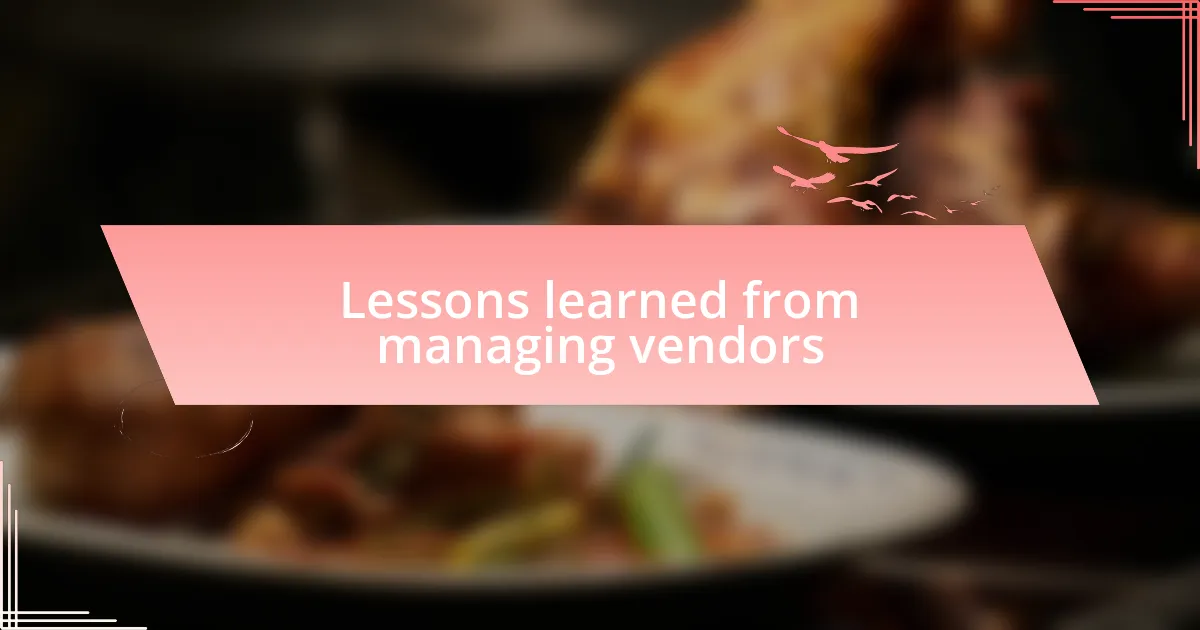Key takeaways:
- Fostering strong vendor relationships through transparency and trust can lead to innovative solutions during challenges.
- Effective communication, including regular check-ins and open feedback, enhances collaboration and reduces misunderstandings.
- Building trust relies on reliability, mutual respect, and celebrating successes together to strengthen personal and business connections.
- Investing time to understand vendor operations can result in improved offerings and a more cohesive partnership.

Understanding vendor relationship management
Vendor relationship management is essentially about fostering strong, mutually beneficial partnerships. In my experience running a food business, I’ve noticed that relationships with suppliers can make or break your operational efficiency. Have you ever felt like your vendors are just another cog in the machine? That mindset can hinder genuine collaboration.
I vividly recall a time when one of my key suppliers faced disruptions in their production. Instead of simply looking for alternative sources, I reached out to them and started an open dialogue. This not only helped us navigate the challenges together but also strengthened our relationship. It was a perfect example of how transparency and trust can lead to innovative solutions in stressful times.
Understanding vendor relationship management also means recognizing the emotional aspects of these partnerships. I’ve learned that the more I invest in these relationships, the more likely my vendors are to go the extra mile for me. It’s like nurturing a friendship; when both sides feel valued and respected, the benefits naturally follow. Have you ever thought about the deeper connections you can create by investing in your vendors? Building that rapport often leads to better service and stronger commitments, too.

Strategies for effective vendor communication
Effective vendor communication hinges on clarity and consistency. I’ve found that regularly scheduled check-ins, whether through calls or emails, help keep everyone on the same page. Have you ever noticed how a simple weekly update can preempt misunderstandings? It creates an environment where both parties feel informed and engaged.
One memorable instance involved a local farmer I collaborated with. During our conversations, I realized listening was just as critical as sharing my own needs. When he expressed concerns over his crop yields, I was able to adapt our ordering process, demonstrating that I value his input. This not only reassured him but also made him more willing to prioritize my orders during peak harvest times.
Moreover, being open to feedback can transform vendor interactions. I once asked a supplier for their thoughts on how my ordering practices impacted their workflow. Their candid response opened my eyes to areas where I could adjust, ultimately leading to smoother operations. It made me wonder: how often do we really invite our partners to share their perspectives? Embracing this two-way dialogue fosters a sense of partnership that can drive mutual success.

Building trust with food vendors
Building trust with food vendors is all about reliability and transparency. I remember one time when I had to make a significant change to my order schedule due to an unexpected spike in demand. Instead of just sending a quick email, I called my vendor to explain the situation in detail. This open dialogue not only helped them understand my needs better but also reinforced our relationship, showing them that I respect the partnership we’ve built.
Trust also thrives on mutual respect in negotiations. I had a supplier who was particularly passionate about sustainable practices. By engaging them in discussions about sourcing options, I realized my willingness to consider their values created a stronger bond between us. It’s fascinating how shared values can pave the way for deeper trust. Have you ever thought about how aligning your business philosophy with that of your vendor can enhance your connection?
Lastly, acknowledging and celebrating successes together can significantly bolster trust. When my vendor launched a new organic line, I made it a point to promote it in my restaurant, sharing my support publicly. Watching their pride and excitement reminded me that our success is intertwined. How often do we take time to celebrate these milestones together, reinforcing not just business ties but also personal connections?

Lessons learned from managing vendors
Managing vendor relationships has taught me the importance of clear communication. I recall a time when a shipment was delayed, and I felt frustration creeping in. Instead of letting it fester, I contacted the vendor to understand the issue. That simple conversation transformed my irritation into empathy, highlighting how staying informed can strengthen our partnership. Have you ever considered how proactive communication might change the dynamics of your vendor relationships?
Another lesson I’ve learned is the value of flexibility. Once, I had a vendor who misunderstood my specific needs for a seasonal menu. Instead of getting upset, I chose to work collaboratively on adjusting the order. This experience not only clarified our expectations but also encouraged my vendor to be more adaptive in the future. It’s remarkable how a little flexibility can foster a culture of responsiveness. Doesn’t it make you wonder how much smoother operations could be with a more adaptable approach?
Lastly, I’ve discovered that investment in vendor relationships pays off in unexpected ways. When I took the time to learn about a vendor’s production process, I gained insights that directly improved my menu offerings. This created a sense of camaraderie and shared purpose, making the partnership feel more like a team effort. Have you ever thought about how understanding your vendor’s business could lead to mutual growth?